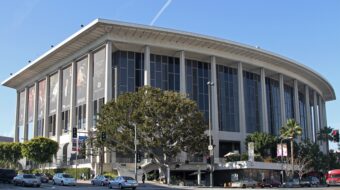OAKLAND, Calif. – Flashing past on the auditorium’s giant screen, they displayed the same ominous pattern – an upward climb, a peak, a downward turn followed by a sharp, unbroken plunge.
Each graph – median home values, property assessments, sales tax revenues, investment income – represented revenues supporting health and human services provided by Alameda County, across the bay from San Francisco. They provided a visual counterpoint to the presentations at a county Board of Supervisors’ Feb. 25 budget forum aptly titled, “The Worst is Yet to Come.”
What is rising, Alameda County Supervisor Keith Carson told the assembled county workers, community organization leaders and members of the public, is the need for food stamps, welfare and health care programs and other supportive services, with counties paying part of the costs.
The supervisors can allocate just 27 percent of the $2.4 billion county budget to meet county needs, said County Administrator Susan Muranishi. Most of this “discretionary spending” funds the county’s share of programs receiving federal funds. Based largely based on property taxes, it has taken an enormous hit during the financial crisis.
County budgets must be balanced; Alameda County was forced to cut a number of programs to close its $177.6 million gap, including a much-protested slashing of already tiny General Assistance grants for recipients deemed “employable.”
Alameda County’s official 10.9 percent unemployment rate “is the best indicator of the need for county services,” Carson said, noting that joblessness also sharply affects revenues. The official county figure of 87,000 jobless could rise sharply this spring, he added, unless Toyota rescinds its impending closure of the New United Motor Manufacturing Co., Inc. auto plant. If the plant closes, nearly 5,000 workers there and another 25,000 or more workers in its supply network would lose their jobs, while the county would lose millions in taxes.
Alameda County also faces the prospect of slashed state funding as the Democrat-led legislature and Republican Governor Arnold Schwarzenegger struggle to close a $20 billion state budget gap.
Schwarzenegger is threatening to cut or end some of the very programs experiencing soaring demand, Carson said, including the Calworks welfare-to-work program, MediCal (state Medicaid) and In-Home Supportive Services enabling aged and disabled people to live at home.
California has struggled for years to cope with growing budget gaps. It is the only state requiring a two-thirds legislative vote to pass a budget or raise taxes; the Democrats’ legislative majority falls short of that and nearly all Republicans have taken a “no new taxes” pledge. Several measures, including a constitutional amendment, have been initiated to end the requirement.
Interviewed after the forum, Carson said he strongly supports undoing the two-thirds requirement. “At this point the legislature has become basically intractable, and the ability of the Republicans to stall anything and even to prevent an honest debate and discussion is leading to a breakdown of the legislative process,” he said.
Noting that many other states also face severe fiscal crises, Carson emphasized that as states, and the federal government, shift programs to local governments, they have a responsibility “not just to pass the pain along,” but to provide “a long-term, appropriate funding source. On the county level it’s direct services that affect the lives of people,” he said.
At the National Governors Association’s winter meeting in Washington last week, governors also expected the worst is yet to come, The New York Times reported. Vermont’s Republican Governor Jim Douglas called the fiscal situation “fairly poor” for most states, and predicted the coming fiscal year “would be the most difficult to date.”
Photo: Alameda County Supervisor Keith Carson speaks at the county’s Feb. 25 budget meeting. Marilyn Bechtel/PW

MOST POPULAR TODAY

Zionist organizations leading campaign to stop ceasefire resolutions in D.C. area


High Court essentially bans demonstrations, freedom of assembly in Deep South

Afghanistan’s socialist years: The promising future killed off by U.S. imperialism

Communist Karol Cariola elected president of Chile’s legislature






Comments